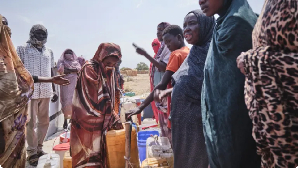Research had shown that the rate of premarital sex among the youth could be reduced if the adult population change their behaviour towards the youth and sex.
Mr. Kofi Abinah, Eastern Regional Population Officer disclosed this at a press briefing at Koforidua on the activities of the Eastern Regional Population Advisory Committee (ERPAC) on Tuesday.
He explained that the focus of youth involvement in sex had been on girls but research proves that large number of adult women engage adolescent boys also as secrete sexual partners.
Mr. Abinah observed that the high teenage pregnancy rate in the Eastern Region was an indication that many teenagers were not engaged in safer sex and such practice is the cause for high rate of sexually transmitted diseases (STDs) and HIV/AIDS.
He said this could explain why the region was leading with the high HIV/AIDS prevalence rate with regional average even above the national average.
Mr Abinah said the RPAC has no staff in the districts and to overcome that it has set up Reproductive Health Network and District Population Advisory Committees (DPACs) to support population activities in the districts.
He said the districts that had benefited from the network system include New Juaben, Suhum-Kraboa-Coaltar, Kwaebibirim, Akuapem North and Akuapem South while those that had benefited from the DPACs include the East Akim, Kwahu South, Birim North , Akuapem North and New Juaben Municipality.
Mr. Abina said last year, the RPAC organised nine workshops for representatives of Community-Based Organisations (CBOs) in the region and this had equipped the organisations with materials, techniques and equipment to join the crusade against the spread of HIV/AIDS.
He called on the CBOs to improve upon their advocacy skills and operate as credible entities to secure the necessary support from policy makers, target groups and funding agencies.
Mr. Abina suggested that HIV/AIDS prevention programmes in the region by other organisations should incorporate other population concerns including Adolescence's Sexually Reproductive Health (ASRH), gender relations and the environment.
He appealed to the media to throw more light on population activities taking place in the region especially those occurring in small rural communities.
General News of Friday, 31 January 2003
Source: .
Population Advisory Committee reviews activities
Opinions











